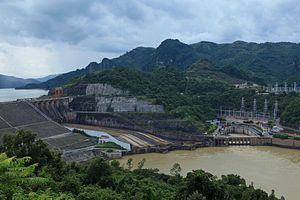Vietnam’s agriculture minister warned that the country may launch a crackdown on dam investors in the wake of growing deforestation in the country, Thanh Nien News reported Thursday.
Cao Duc Phat, Vietnam’s minister for agriculture and rural development, said that the government may impose harsher penalties on hydropower investors for failing to meet their reforestation targets and compensation obligations.
“The businesses are thumbing their noses at the rules…If they don’t fall in line, we will bring the matter before the government and National Assembly in May of 2015,” Phat said.
Constructing dams often involves both clearing forested areas in order to flood vast tracts of land as well as resettling villagers from project sites. Recognizing the deleterious effects of this process, the Vietnamese government has required dam investors to undertake obligations to offset these impacts, such as replanting trees and adequately compensating affected people.
But according to the Tien Phong newspaper, Nguyen Ba Ngai, the deputy director of Vietnam’s forestry department, recently said that hydropower investors only planted 2,450 hectares of forest in 2014, meeting only 22 percent of the required target. And while investors are also allowed to offer financial compensation instead of replanting trees to help offset cleared forests, provinces report that they have received little of that money.
Currently, such violations are only punished by a cash fine.
But Phat says he is working with other ministers to impose harsher penalties, including potentially revoking the licenses of dam investors for particular projects.
“I recommend that we revoke the license of any projects which continually delays the restoration and compensation process,” Phat said.
Deforestation has long been recognized as a major problem for Vietnam. In 2013, an analysis of satellite imagery by the World Wide Fund for Nature (WWF) revealed that from 1973 to 2009, Vietnam had already lost 43 percent of its forest cover – the most forest destruction in the entire Mekong subregion. It also projected that if current trends continue, deforestation would be a widespread phenomenon in Vietnam by 2030, with the greatest losses anticipated in parts of the Central Highlands and northern provinces.
That concern, combined with other environmental and related problems including flooding, dam breaches, massive resettlement, and soil erosion, has accounted for the rising anti-dam sentiment in Vietnam. In response, the government has scrapped plans to build more hydropower plants and tightened regulations to account for local needs. Vietnam has also consequently grown more vocal about its opposition to dam projects built in neighboring Mekong countries that could exacerbate existing problems, principally the Xayaburi and the Don Sahong dams.
Vietnam generates up to around 40 percent of its power from about 7,000 dams in the country, most of which are small or midsize. Hundreds more are reportedly in the works.

































